‘A light to others’
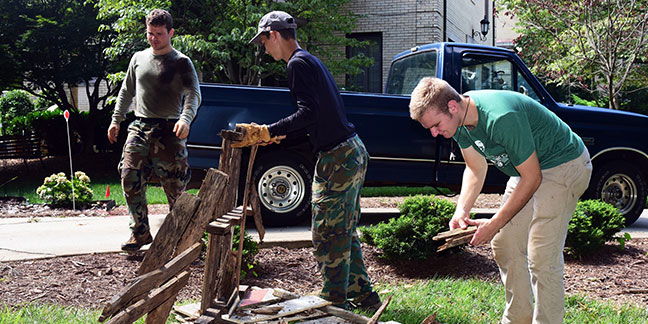 (From left) Charlotte seminarians and St. Joseph Workers Ronan Ostendorf, Gabriel Lugo and Carson Cannon clean up the area surrounding the Marian grotto next to the rectory at St. Patrick Cathedral in Charlotte July 12. (Photo provided by James Sarkis)MOUNT HOLLY — Men from St. Joseph College Seminary have become “St. Joseph Workers” this summer, spending their time out of school to do yardwork, refinish floors, build a fire pit, and more.
(From left) Charlotte seminarians and St. Joseph Workers Ronan Ostendorf, Gabriel Lugo and Carson Cannon clean up the area surrounding the Marian grotto next to the rectory at St. Patrick Cathedral in Charlotte July 12. (Photo provided by James Sarkis)MOUNT HOLLY — Men from St. Joseph College Seminary have become “St. Joseph Workers” this summer, spending their time out of school to do yardwork, refinish floors, build a fire pit, and more.
While not a formal aspect of their seminary formation, this work for people and parishes around the diocese aims to help build the seminarians spiritually and socially – another aspect of St. Joseph College Seminary’s holistic approach to priestly formation, seminary leaders say.
“We started the St. Joseph Workers back in the summer of 2018 as a means of providing college seminarians with continuity in their formation by allowing them to stay at the seminary, giving them access to the sacraments and communal prayer, as well as continuing to build their fraternity through sharing a common life and work,” explains Father Matthew Buettner, the seminary’s house spiritual director.
One of the workers’ projects has been at St. Patrick Cathedral in Charlotte, where they have cleaned out and freshened up the area around the Marian grotto near the rectory.
Father Christopher Roux, pastor and rector, says the workers have been incredibly helpful. “It’s terrific to have the young men here. Not only are we able to get a few extra projects completed, but they are meeting folks who come to the church and office, and this allows them to be known in person.”
Seminarian Peter Townsend, who attends St. Ann Parish in Charlotte, is one of this year’s St. Joseph Workers.
“The St. Joseph Workers program is a great opportunity to continue living the life of a seminarian while on summer vacation,” Townsend says. “It can be difficult, especially after becoming accustomed to seminary life and its daily schedule, to going back to a more relaxed routine.
“However, with the St. Joseph Workers program, I am able to maintain our prayer schedule, remain in community, and live with the Blessed Sacrament, all while traveling to different locations throughout the diocese to serve the people of God.”
Seminarians want to participate in the program, he adds, so they can remain connected to prayer, brotherhood and the Holy Eucharist during the summer break.
“I hope that our witness will allow people to get to know us on a more personal level – we aren’t just faces on a card! – and will let them know that we are willing to serve them,” Townsend says, referring to the seminarian posters and prayer cards found in every parish throughout the diocese.
“I think that a man’s character is revealed in how he treats his work and responsibilities,” he also says. “As a result, the seminarians with the St. Joseph Workers program are hoping that by working well, being a light to others and by putting all of our effort into any project, the people of the diocese will know that we will work just as hard as their pastors and priests.
“There are good and hard-working men with the program this year, and I’m proud to work alongside them wherever we go and whatever we do.”
The St. Joseph Workers program benefits parishes and families who hire them by having contact with the men, getting to know them and contributing to their formation, as well as supporting vocations generally.
“One man who spent time with the seminarians told me, ‘They are amazing young men. They work hard, fast and smart,’” Father Buettner says. “Another man who worked with them reported, ‘The young men you sent did a fabulous job. I was very impressed by the knowledge they already had, how well they quickly grasped the scope of the project, and how well they took direction.’”
He says the program has grown so well in its short history that for the first time this summer, the workers didn’t have to look for work to do. “Requests for the St. Joseph Workers extended beyond what the workers could accomplish in a summer,” he notes.
— SueAnn Howell, Senior reporter
Releated story: College seminary grad builds log chapel to honor Our Lady of Sorrows
Reconnect with your faith in a place of natural beauty and peace
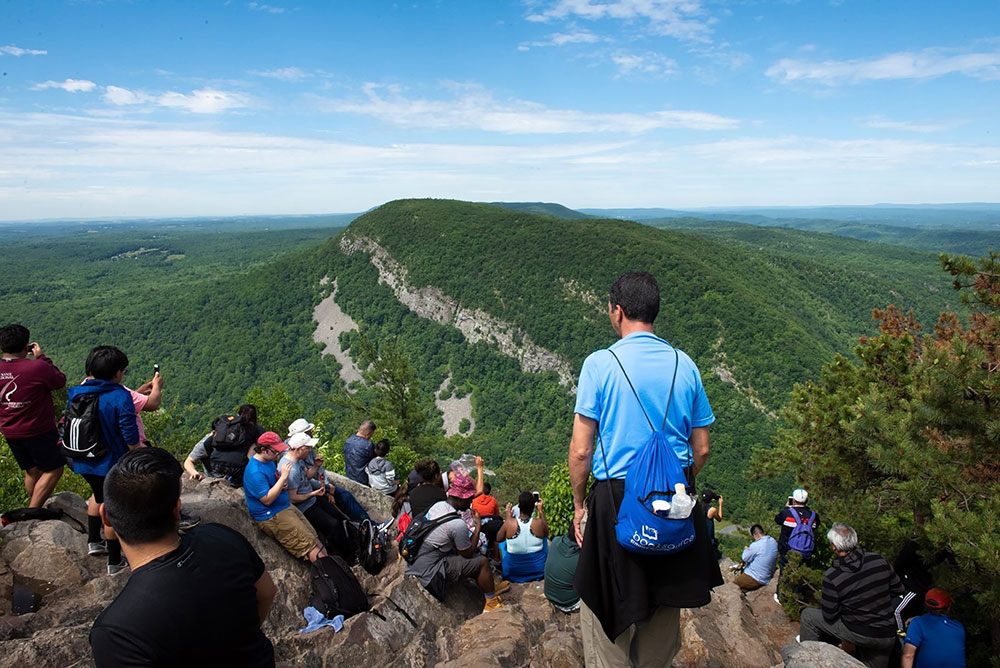
A comfortable outfit. A question about life’s direction. A toothbrush, toothpaste. And these days, a pandemic-weary heart.
Along with everyday items, people making retreats often “pack” questions or concerns that they hope to engage with during their time in quiet, away. These vary from person to person, influenced by personal experience, present concerns and even, perhaps, anxiety about personal piety or “worthiness.”
The type of retreat can frame questions, too. A preached, group retreat might focus on a particular topic about faith or spirituality, whereas a self-directed retreat might provide less structure and more spiritual breathing room.
But whether for a 30-day Ignatian experience or a weekend of faith exploration, one of the blessings of a retreat is that neither the packing nor the person making the “getaway with God” need be perfect. Unexpected peace, new forms of prayer, insight, relaxation and reflection can bring the retreatant, however imperfect, into a profoundly rich experience.
“Retreats aren’t just for pious people. They’re for people trying to find God in their lives, in whatever clumsy or bumbling way. You don’t have to be perfect to walk in the retreat door,” says Jesuit Father William Campbell, director of Gonzaga Eastern Point Retreat House in Gloucester, Mass.
“Once the person is here, we begin from a place of Ignatian spirituality,” Father Campbell says. “We’ll often ask the directee or retreatant, ‘Why are you here? What’s the desire within you that’s prompted you to make the retreat? In the midst of this desire, who is God for you now?’”
He added, “Focus on the present can be a blessed beginning for first-time retreatants afraid of being ‘inadequately prepared.’ It can also encourage those with more retreat experience, but who might have been so distanced from faith during the pandemic that they are not sure how to reengage.”
A blessing on any retreat, more time to pray can spark insight and connections with profound faith traditions. Retreats also provide a way to find solace for anyone who has been battered by the COVID-19 pandemic.
“People are definitely thrilled to be able to gather together,” says Deacon Scott Gilfillan, who runs the Catholic Conference Center in Hickory. “I see a deep human longing for interpersonal contact that was suppressed for over a year. In May, groups started returning in significant numbers. Every person I talked to said the same: It’s good to be back in the company of other people of faith.”
This special encounter with prayer and liturgy in a retreat’s quieter and usually lovely setting can also be a good way to ease back into parish life.
“People want to reconnect with their faith,” says Benedictine Father Patrick Sheridan, “and do it in a place that’s a little less crowded, a little more calm than their parish.”
Father Sheridan is the guestmaster at St. Andrew’s Abbey Retreat Center in Valyermo, Calif.
Deacon Gilfillan agrees. “I think people are also longing to find a deeper connection with God. Midway through the pandemic, we started promoting private ‘Find Your Center’ retreats. Going from maybe one private retreat a year in the pre-pandemic days, we’re now getting one or two a month.”
The “Find Your Center” retreats have become so popular, he said, that he is refurbishing a 100-year-old farmhouse on the property to better accommodate private, silent retreats, and he is obtaining continuing education in spiritual direction to be able to better serve retreat participants.
What are retreat-goers looking for?
Peace, and the ability to get away from the worries of daily life, say the directors of the Diocese of Charlotte’s two retreat centers.
The ability to go on retreat close to home – either individually or in small groups – has been especially helpful to people during the pandemic, says Deacon William Shaw, who runs Living Waters Catholic Reflection Center in Maggie Valley. With appropriate health measures in place, both centers were able to continue welcoming retreatants and providing a safe and tranquil retreat experience during the pandemic.
“Our approach has been to allay the apprehensions with offerings that supported the words of St. John Paul II – ‘Fear not, it is I’ – as those who came for a day, a weekend or even a week were seeking hope and peace during the absence of interpersonal contacts,” Deacon Shaw says. “Living Waters fits well in the line in the Gospel, ‘Let us come away to a quiet place and be renewed.’”
So, if you think the idea of a retreat sounds pretty good about now, where can you start?
Check out the information at right provided by the diocese’s two retreat centers: the Catholic Conference Center and Living Waters Catholic Reflection Center.
The center in Hickory, located at the foot of the Blue Ridge Mountains, has ample space for large groups but is also a peaceful campus for individual retreats. Nestled amid majestic Smoky Mountain views, Living Waters offers a cozier retreat facility and the soul-satisfying natural beauty of Maggie Valley.
Afraid you’re not “perfect” enough for a retreat?
“The whole point is to relax in the Lord,” says Father Sheridan. “Don’t put a lot of pressure on yourself. Let the Spirit move you. A retreat can be an opening of a different approach to life, a process, rather than a one-off experience. And hopefully, you’ll come back again.”
— Maureen Pratt, Catholic News Service. Catholic News Herald contributed.
 Catholic Conference Center
Catholic Conference Center
1551 Trinity Lane, Hickory, NC 28602
828-327-7441 www.catholicconference.org
The Catholic Conference Center, located amid the beautiful rolling hills near Baker Mountain State Park, offers a unique site where guests can be renewed and transformed – whether it’s for Sunday brunch, a weekend or overnight retreat, or a week-long conference. With its stunning architecture and expansive grounds, it’s no surprise the center has become a preferred location for religious, civic, school and business groups to have retreats, training, workshops, reunions and receptions. The center features meeting spaces for up to 200 people, state-of-the-art audiovisual equipment and amenities, 50 rooms for overnight stays, fine dining provided by an award-winning chef, and an experienced hospitality staff.
Looking for a place for a group retreat? Weekends into 2022 are already filling up fast, so contact them soon. The “Find Your Center” private retreats are also a popular choice anytime – call the center or go online for details.
Upcoming events include “From Soldier to Saint: A Men’s Retreat” with Father Peter Tremblay Aug. 6-8, a Worldwide Marriage Encounter Aug. 27-29, and a Women’s Walk with Christ Weekend Sept. 24-26.
 Living Waters Catholic Reflection Center
Living Waters Catholic Reflection Center
103 Living Waters Lane, Maggie Valley, NC 28751
828-926-3833 www.catholicretreat.org
Nestled within the beautiful Smoky Mountains at Maggie Valley, Living Waters is a serene and peaceful location that offers private or group retreats as well as preached, directed, and nature retreats. Guests come to enjoy incredible mountain views all year long to renew their spirits and reconnect with God’s creation. Come drink in the beauty of the mountains and spend time in prayer in the valley. Overnight lodging is provided in the main building, as well as separate lodging for groups or families in the four-bedroom Our Lady of Lourdes Cottage.
Upcoming retreats are “No Lasting City” with Father Ray Williams Aug. 13-15, “Hearing the Call: Women of the Gospels who Encounter Jesus” with Olivia Woodford Aug. 27-29, and “Gospel Portraits” with Michael Coyle Sept. 24-26.
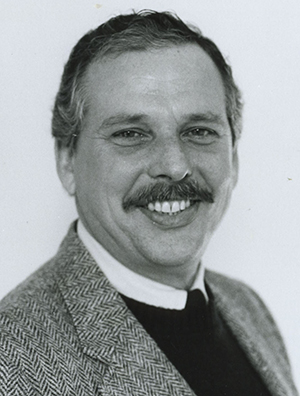 Al BehmCHARLOTTE — A New York man has filed a lawsuit alleging he was exploited and sexually abused as a youth in North Carolina and elsewhere by former lay missionary Al Behm, who was assigned by his religious community to work in western North Carolina more than 40 years ago.
Al BehmCHARLOTTE — A New York man has filed a lawsuit alleging he was exploited and sexually abused as a youth in North Carolina and elsewhere by former lay missionary Al Behm, who was assigned by his religious community to work in western North Carolina more than 40 years ago.
The civil suit filed July 6 in Mecklenburg County Superior Court names as defendants Behm and his former religious community, the Ohio-based Glenmary Home Missioners, as well as the Diocese of Charlotte.
The lawsuit alleges the misconduct began in the 1970s when the claimant was a minor living in Connecticut and continued into his college years at Western Carolina University in Cullowhee. Glenmary assigned Behm to work as campus chaplain there from 1980 to 1984. The suit contends Glenmary and the diocese were negligent in supervising Behm.
At the time of the alleged abuse, the Glenmary Home Missioners staffed communities in far western North Carolina where there were few Catholics, including Sylva. Glenmary clergy and missionaries running the Sylva parish also maintained a presence on the nearby WCU campus. Behm was not an ordained clergy member but worked there as a missionary, or brother, on behalf of the religious community until 1984 when Glenmary assigned him to work in another state.
Current leaders of the Charlotte diocese said Friday they had no prior knowledge of this abuse allegation, and are reviewing the suit and praying for the claimant.
In a statement, the diocese said its historical review of clergy personnel and other files in 2019 “found no record of any allegations of child sexual abuse by Al Behm during his time in North Carolina 40 years ago.”
Glenmary President Father Dan Dorsey said in a July 9 statement, “I cannot comment on active lawsuits, but I can say that at times in the past Glenmary has failed to protect minors and vulnerable adults. Moreover, our response to victims has often been inadequate. On behalf of Glenmary I deeply regret these failures. Glenmary is committed to healing and justice for all involved.”
In October 2019, Glenmary publicly named Behm on its list of credibly accused missioners for an allegation of abuse it said was reported to have occurred outside North Carolina. That list prompted the Diocese of Charlotte to include Behm on the diocese’s accountability website, on a list of those who once served here and later were accused of abuse elsewhere.
“The Charlotte diocese has zero tolerance for child sexual abuse and we continue to encourage anyone who has been the victim of abuse to seek help and report to authorities,” the diocese’s statement said.
According to information provided by Glenmary, Behm joined the order as a lay missionary in 1960 and served in nine dioceses before leaving the society in 1993.
Attorneys filed the lawsuit claiming it is timely under North Carolina’s 2019 SAFE Child Act, which provides for a two-year window to bring certain civil claims of child sexual abuse that had been precluded by the state’s statute of limitations.
— Patricia L. Guilfoyle, editor
Suspect sexual abuse or misconduct?
If you have information about possible sexual abuse or misconduct by any clergy, employee or volunteer of the Diocese of Charlotte, please contact law enforcement. You can also report concerns safely, securely and anonymously 24/7 over the phone at 888-630-5929 or online at www.RedFlagReporting.com/RCDOC.
Full statement from the Diocese of Charlotte:
The Diocese of Charlotte’s historical file review found no record of any allegations of child sexual abuse by Al Behm during his time in North Carolina 40 years ago.
Behm was a lay missionary whose supervising religious order, the Ohio-based Glenmary Home Missioners, served sparsely populated areas of far western North Carolina. The order assigned Behm to work at Western Carolina University in 1980. They assigned him to ministry outside of North Carolina in 1984, and Behm left the Glenmary order in 1993.
In October 2019, Behm was publicly named on Glenmary’s list of members accused of abuse, for an allegation the order said was reported to have occurred in Kentucky in the 1970s. Glenmary’s list prompted the Diocese of Charlotte to include Behm’s name on our accountability website, on a list of those who served here and were later accused of abuse elsewhere.
The Charlotte diocese has zero tolerance for child sexual abuse and we continue to encourage anyone who has been the victim of abuse to seek help and report to authorities.
NFP Week: July 25-31, 2021
NFP Awareness Week: ‘To have, to hold, to honor’
 CHARLOTTE — “To have … To hold … To honor, Natural Family Planning, Supporting God’s gifts of love and life in marriage” is the theme of this year’s national Natural Family Planning Awareness Week, an educational campaign of the U.S. Conference of Catholic Bishops to celebrate God’s vision for marriage and promote the methods of Natural Family Planning.
CHARLOTTE — “To have … To hold … To honor, Natural Family Planning, Supporting God’s gifts of love and life in marriage” is the theme of this year’s national Natural Family Planning Awareness Week, an educational campaign of the U.S. Conference of Catholic Bishops to celebrate God’s vision for marriage and promote the methods of Natural Family Planning.
Natural Family Planning is the general title for ethical, natural, safe and effective methods for both achieving and avoiding pregnancy in marriage. NFP methods teach couples how to observe and interpret the wife’s signs of fertility and infertility. In the words of the Catechism of the Catholic Church, NFP methods “respect the bodies of the spouses, encourage tenderness between them and favor the education of an authentic freedom” (CCC 2370).
The dates of Natural Family Planning Awareness Week are July 25-31. These dates highlight the July 25 anniversary of the papal encyclical “Humanae vitae,” which articulates Catholic beliefs about human sexuality, marriage, conjugal love and responsible parenthood.
The Diocese of Charlotte joins with the U.S. bishops in highlighting the benefits of NFP as ethical methods to help married couples live God’s design for their marriages.
The diocese’s NFP program, which falls under the umbrella of Catholic Charities’ Family Enrichment Services, regularly offers free NFP-focused courses, in English and in Spanish, around the diocese for small groups. Online and private instruction options are also available. Continued support is provided for follow-up, when seeking to prepare for pregnancy, and during transitions, such as postpartum or perimenopause.
The diocese also offers laypeople and health professionals guidance for making their medical practices pro-life and affirming of fertility. Are you looking for an NFP-supportive physician, or are you a health professional interested in continuing education related to NFP? Contact Natural Family Planning Program Director Batrice Adcock, MSN, RN, at 704-370-3230 or This email address is being protected from spambots. You need JavaScript enabled to view it..
Learn more online
At www.ccdoc.org/en/services/family-enrichment/natural-family-planning: Learn more about NFP classes offered in the Diocese of Charlotte
At www.usccb.org/topics/natural-family-planning/church-teaching: Learn more about embracing God’s plan for married love and the Church’s teachings that support the use of NFP in marriage.
MY STORY: Megan Blum
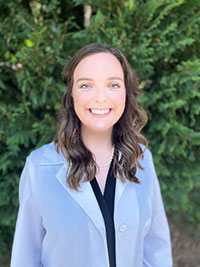 Two pink lines stared back at my husband and me, as we read the test strip for the first time trumpeting the revelation that God had blessed our new marriage, just in its second month, with the gift of life. I was in the middle of my fast-paced physician assistant training program, and getting pregnant was not in our plan. But it was in God’s plan.
Two pink lines stared back at my husband and me, as we read the test strip for the first time trumpeting the revelation that God had blessed our new marriage, just in its second month, with the gift of life. I was in the middle of my fast-paced physician assistant training program, and getting pregnant was not in our plan. But it was in God’s plan.
Many emotions hit us that day – excitement, joy, anxiety, fear and faith. We had many questions for God, including: Would we be able to find a Catholic medical practice to support us during our journey to parenthood and beyond? Thankfully, we were able to find a local Catholic physician in our small town in the North Carolina foothills. However, this is not always the case for women and their spouses in the Diocese of Charlotte.
Many of you may have struggled, or know of someone who has struggled, to find a medical practice that provides holistic women’s healthcare that honors and respects the teachings of the Catholic faith. Or maybe you have found a practice, only to find out that it’s too far away or not accepting new patients. I aim to fix this problem for rural Catholic North Carolinians and anyone seeking pro-life women’s care.
My name is Megan Blum, and I am a Catholic physician assistant living in the diocese. This is my sixth year in the Church, and St. John Paul II’s Theology of the Body played a huge part in my conversion. I strive to honor women’s God-given dignity and design in my medical practice. I am eager to start a telehealth practice through My Catholic Doctor to provide fertility-awareness-based medicine to women living in the two dioceses of North Carolina – especially women living in rural North Carolina. My goal is to offer medical management of women’s health issues, such as infertility, premenstrual syndrome, polycystic ovarian syndrome, irregular cycles, acne, menopause symptom management, and post-partum anxiety and depression – among many others. I want to offer this care via telehealth using top fertility-awareness based medicine models, including Naprotechnology, FEMM and Marquette.
I cannot do this without the support of time, talent and treasure from the faithful of our great diocese. Many talented medical professionals and natural family planning instructors in our diocese have given their time and talent to mentor me on this journey. For this, I am beyond grateful. Some have given their treasure, as well. To become certified in the three models mentioned above, I need to raise $13,000 for tuition and other educational expenses. I am about $11,000 short of my goal. I am raising money through a GoFundMe page. If you find it in your heart to give to my cause, any amount donated is a huge blessing and would help offset the cost of the training.
If you cannot donate, would you consider lifting my medical practice up in your prayers? Please pray that women in rural North Carolina and in other rural areas of the United States will find medical professionals who acknowledge their true and beautiful design. I will leave you with one last thought from Psalm 139:14: “I praise you, for I am wondrously made. Wonderful are your works!” May we all experience the wonder in God’s glorious design of women and their gift of fertility.
You can find my GoFundMe here: www.gofund.me/d9603aeb. Additionally, please help me get the word out about my fundraiser and about the lack of fertility-awareness-based medicine in North Carolina by sharing my story to friends, family or colleagues. For further information, contact me at This email address is being protected from spambots. You need JavaScript enabled to view it..
— Megan Blum
MY STORY: Jillian Martel
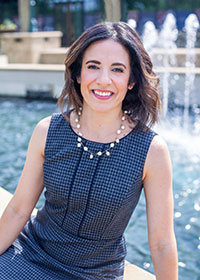 I think the Holy Spirit has to work extra hard on some people. I’m one of those people. I have been practicing as an OB/GYN physician in the south Charlotte area for eight years now. A lifelong Catholic, I always considered myself a pro-life physician. But working in a secular practice, prescribing hormonal birth control was a part of my daily work.
I think the Holy Spirit has to work extra hard on some people. I’m one of those people. I have been practicing as an OB/GYN physician in the south Charlotte area for eight years now. A lifelong Catholic, I always considered myself a pro-life physician. But working in a secular practice, prescribing hormonal birth control was a part of my daily work.
While I always knew of the Church’s teaching about hormonal contraception, I honestly just chose to ignore it – convincing myself that the teaching was antiquated and therefore didn’t apply for women today, either for myself or my patients. Sadly, in medical training, we are taught to treat a majority of gynecologic conditions with hormonal birth control, implants or IUDs, and so that’s what I did for four years of residency and eight years of private practice.
It wasn’t until 2020, when the pandemic hit, that I began to see the error in this thinking and this way of practicing. As so many of my internal medicine, ICU and ER colleagues were putting their lives at risk treating COVID-19 patients, I was sitting safely at home doing virtual visits prescribing birth control over the internet. It just felt lonely and wrong.
So I began to look more closely at Scripture and the Church’s teaching.
This is where the Holy Spirit led me to a conversion of heart, leading me to several people who helped guide me in this process. While sitting in the Charlotte Douglas International Airport waiting on a delayed flight, I read “Humane vitae” for the first time. I began looking into fertility-awareness-based methods (FABM) of treating gynecologic and other hormonal problems. I began really talking to patients and began to recognize that many of my patients – Catholic or not – are simply looking for a better way to plan pregnancies and to treat hormonal and fertility problems. Many, if not most, of my patients were frustrated with the risks, side effects and costs of the hormonal contraception I had been prescribing them.
St. Paul says in his first letter to the Corinthians: “Do you not know that your body is a temple of the Holy Spirit within you, which you have from God? You are not your own; you were bought with a price. So glorify God in your body.”
And here I was, a cradle Catholic, prescribing birth control that was harming both the spiritual and physical aspects of my patients’ lives.
The Holy Spirit went to work in my personal life as well. After seven years of marriage, most of those spent using hormonal contraception, my husband and I began using NFP.
It has made a world of difference in our communication and in the health of our marriage.
Like I said, the Holy Spirit really had to work on me. It took a pandemic and eight years of secular practice to move this mountain. I have at last accepted the calling to transition my practice to FABM, or Natural Family Planning (NFP). Unfortunately, the medical profession of OB/GYN is completely at odds with the tenets of NFP and therefore, medical training in this particular arena is not provided in the vast majority of medical schools and residency programs. I have completed training in fertility education and medical management (FEMM), and have been blown away by how much there is to learn. I will be attending the natural procreative technology (NAPRO) training in the fall in Omaha, Neb., to better serve Charlotte-area residents looking for this type of medical care. I pray that the Holy Spirit will continue to be patient with me, guiding me to always practice with His truth in my heart and to practice medicine as a servant of God and His people.
— Jillian Johnston, MD, FACOG; Novant Health Southeast OB/GYN


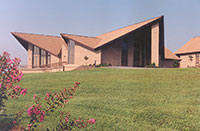 Catholic Conference Center
Catholic Conference Center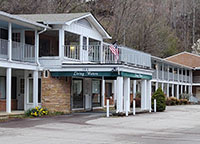 Living Waters Catholic Reflection Center
Living Waters Catholic Reflection Center